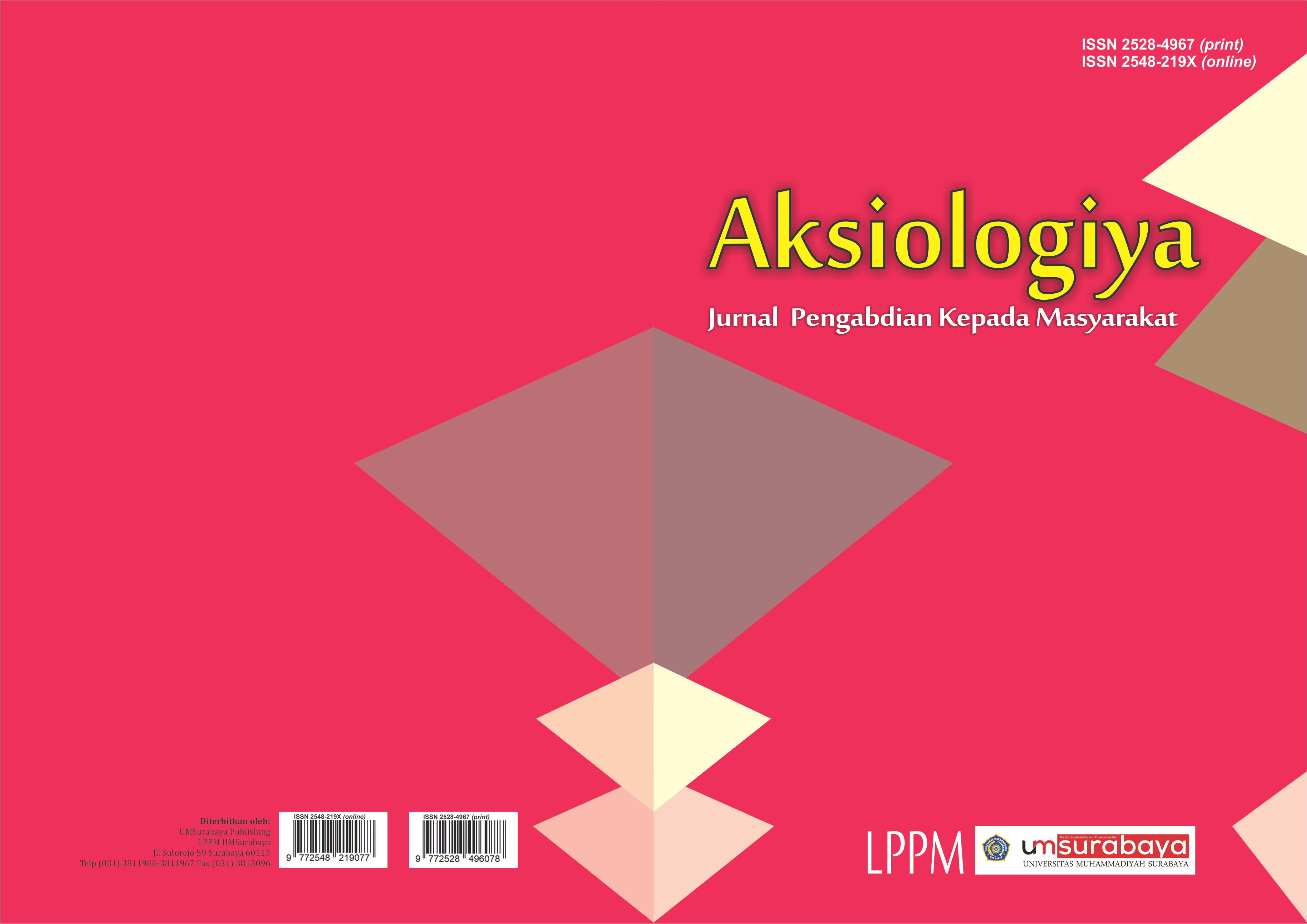Isi Artikel Utama
Abstrak
ABSTRAKÂ
Fisika adalah ilmu yang sangat erat dengan kehidupan sehari-hari dan menjadi tonggak perkembangan teknologi. Oleh sebab itu, mata pelajaran fisika diberikan pada siswa-siswa Sekolah Menengah Atas (SMA). Pembelajaran Fisika harusnya menekankan pada pengalaman langsung untuk mengembangkan kompetensi agar siswa mampu memahami fenomena alam. Hal ini akan membantu siswa untuk memperoleh pemahaman yang lebih mendalam. Akan tetapi, banyak sekolah-sekolah di Indonesia tidak memiliki peralatan yang cukup memadai untuk menunjang pembelajaran eksperimen, termasuk beberapa SMA di daerah Surabaya dan sekitarnya. Program Studi Pendidikan Fisika sebagai institusi yang mencetak calon guru-guru fisika perlu memberikan andil dalam mengatasi keterbatasan yang dimiliki oleh SMA-SMA di Surabaya dan sekitarnya. Program Studi Pendidikan Fisika memiliki peralatan dan sumber daya manusia yang cukup memadahi sehingga memungkinkan untuk mengadakan program pengabdian masyarakat berupa Pendampingan Eksperimen Fisika untuk Siswa-Siswa SMA. Program ini telah terlaksana sejak September 2018 hingga April 2019 melibatkan 14 sekolah mitra dengan jumlah siswa yang berpartisipasi sebanyak 1259 siswa. Kegiatan ini mendapatkan respon yang baik dari pihak sekolah, guru fisika, dan para siswa. Melalui kegiatan ini, keterbatasan peralatan eksperimen di sekolah cukup teratasi. Para siswa juga antusias sebab dengan kegiatan eksperimen pembelajaran fisika menjadi lebih menarik.
Kata Kunci: eksperimen fisika; pengabdian kepada masyarakat; sekolah menengah atas.
ABSTRACTÂ
Physics is closely related to our daily life and becomes a fundamental subject for technology development. That is why physics is given to high school students. The physics learning process should emphasize direct experience to guide students in understanding phenomena in nature. The direct experiment will stimulate students to develop their in-depth knowledge.  However, most schools in Indonesia, including in Surabaya, do not have adequate experiment apparatus to support that physics learning activity with experiments. Department of Physics Education, as an institute that educates pre-service physics teachers, should contribute to solving the limitation of some senior high schools in Surabaya. Department of  Physics Education in Widya Mandala Catholic University has sufficient experiment facilities and human resources to conduct a community service program in the form of Physics Experiment Assistance for High School Students. The program has been conducted from September 2018 until April 2019. There are 14 schools attendinng this program, with 1259 students involved. This program gains positive responses from school principals, physics teachers, and students. Through this program, the limitation of several high schools in providing experiment facilities can be partially solved. Students who involve in this program are enthusiastic because, through experiments, physics learning activity becomes more interesting.
Keywords: community service; physics experiment; senior high school.
Kata Kunci
Rincian Artikel
Hak cipta artikel dimiliki oleh jurnal AKSIOLOGIYA
Ciptaan disebarluaskan di bawah Lisensi Creative Commons Atribusi-NonKomersial 4.0 Internasional.
Referensi
- Aktamis, H., Faculty, A. M., & Eyl, D. (2008). The effect of scientific process skills education on students’ scientific creativity, science attitudes and academic achievements. Asia-Pacific Forum on Science Learning and Teaching, 9(1), 1–21.
- Amnah, R., Rauf, A., Rasul, M. S., Mansor, A. N., Othman, Z., & Lyndon, N. (2013). Inculcation of Science Process Skills in a Science Classroom. Asian Social Science, 9(8), 47–57. https://doi.org/10.5539/ass.v9n8p47
- Etkina, E., Van Heuvelen, A., Brookes, D. T., & Mills, D. (2002). Role of Experiments in Physics Instruction — A Process Approach. The Physics Teacher, 40(6), 351–355. https://doi.org/10.1119/1.1511592
- Giancoli, D. C. (2014). Fisika: Prinsip dan Aplikasi (terjemahan). Jakarta: Erlangga.
- Hofstein, A., & Lunetta, V. N. (1982). The Role of the Laboratory in Science Teaching: Neglected Aspects of Research. Review of Educational Research, 52(2), 201–217. https://doi.org/10.3102/00346543052002201
- Padilla, M. J. (1990). The Science Process Skills. Research Matters - to the Science Teacher, 9004.
Referensi
Aktamis, H., Faculty, A. M., & Eyl, D. (2008). The effect of scientific process skills education on students’ scientific creativity, science attitudes and academic achievements. Asia-Pacific Forum on Science Learning and Teaching, 9(1), 1–21.
Amnah, R., Rauf, A., Rasul, M. S., Mansor, A. N., Othman, Z., & Lyndon, N. (2013). Inculcation of Science Process Skills in a Science Classroom. Asian Social Science, 9(8), 47–57. https://doi.org/10.5539/ass.v9n8p47
Etkina, E., Van Heuvelen, A., Brookes, D. T., & Mills, D. (2002). Role of Experiments in Physics Instruction — A Process Approach. The Physics Teacher, 40(6), 351–355. https://doi.org/10.1119/1.1511592
Giancoli, D. C. (2014). Fisika: Prinsip dan Aplikasi (terjemahan). Jakarta: Erlangga.
Hofstein, A., & Lunetta, V. N. (1982). The Role of the Laboratory in Science Teaching: Neglected Aspects of Research. Review of Educational Research, 52(2), 201–217. https://doi.org/10.3102/00346543052002201
Padilla, M. J. (1990). The Science Process Skills. Research Matters - to the Science Teacher, 9004.


